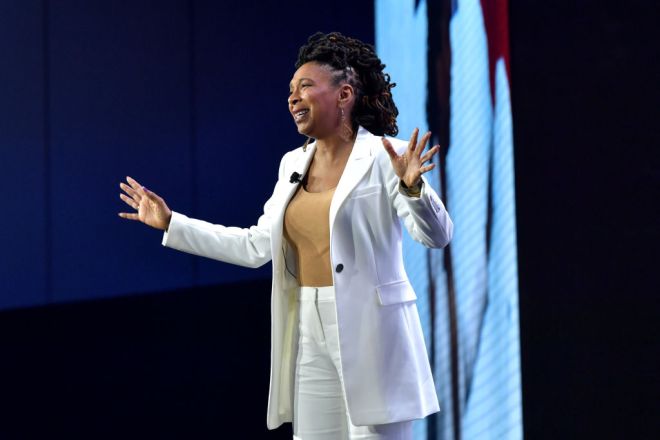The Political Power And Legacy Of Black Women Is Undefeated
Intersectionality, Black Lives Matter & Say Her Name Movement, (1989-Present)

Source: Emma McIntyre / Getty
“Intersectionality is a political and structural lens through which you can see where power comes and collides, where it interlocks and intersects.”— Kimberlé Crenshaw
“…too often we have a caveat when it comes to defending, protecting, and caring for Black women and girls.”— Treva Lindsey
“Black women are held to different standards. To be a woman who is a leader, there is definitely always going to be even more scrutiny.”— Tamika Mallory
In 1989 while writing her essay, “Demarginalizing the Intersection of Race and Sex,” Kimberlé Crenshaw, a black feminist scholar, was looking for a term that spoke to the oppression of Black women in society, while also demonstrating how their social and political identities connected to create different layers of discrimination.
By 1991, Crenshaw had pioneered a whole new movement with one term. Her second essay: “Mapping the Margins: Intersectionality, Identity Politics, and Violence against Women of Color” became a new advocacy for Black women’s race and gender issues that had arrived. And the consensus was clear: The word intersectionality was born and it was here to stay.
The concept of intersectionality challenged notions that gender or class alone were primal factors in regard to women’s mainstream issues. The term, used as a way to explain the oppression of Black women, has catapulted to the forefront of political national discourse in regard to racial justice, identity politics and police brutality. While intersectionality broadened the scope to include the social and political oppression of Black women, Crenshaw would have to harness the same spirit to inform a new leading movement addressing Black women tragically killed by police.
In July 2013, three Black women, Patrisse Cullors, Alicia Garza and Opal Tometi formed the Black Lives Matter movement following the killings of Trayvon Martin, Michael Brown, Eric Garner, and among others. BLM became a social-political phenomenon seeking to address racism, inequality and discrimination against Black people—largely those killed by police. And while the movement has become internationally known for its support of Black men killed by police, it was criticized for its insufficient focus on its Black female counterparts.
In her 2014 essay: Post-Ferguson: “A Herstorical Approach to Black Violablity,” civil rights advocate, Treva Lindsey was one of many who argued that while Black women led the Black Lives Matter, Black Lives the movement sidelined the experiences of Black women in favor of Black men.
In response, Kimberlé Crenshaw, with her organization, the African American Policy Forum(AAPF) founded #SayHerName, a movement that focused specifically on the police-related killings of Black women, intersecting their names into the Black Lives Matter discourse.
#SayHerName has become a rite of passage for activists such as Tamika Mallory, who has used the term to address the tragic police killing of Breonna Taylor in March 2020.
The 2020 election made Kamala Harris the first Black woman to win and serve as the vice president in the history of the United States. In September 2022, Ketanji Brown Jackson was sworn in as the first Black female Supreme Court Justice. Although these recent elections demonstrate that Black female officials elected have increased, Black women remain politically underrepresented in all levels of government.
Misogyny, racism and classism are unfortunately still barriers that keep Black women from rising in more high political spaces. In this recent election, I was painstakingly reminded that although we possess a political power and legacy that has benefited all persons, we are still surrounded by a world where misogynists do not want to see us continue in that power, as well as racists, who don’t consider us to be their equal counterparts.
It is possible that I could understand such a barrier— this lack of Black women in politics—if there were no historical references to our active participation to lead efforts for equitable rights in America. And though Black women have been overlooked in history books, absent from the narratives of successful political efforts, the political power of Black women is a deep, undeniable span of building leading movements and breaking barriers.
Though this recent election did not demonstrate a rise in the political representation of Black women, it did expose the barriers necessary for us to aim higher. With such an expansive history and legacy in the pursuit of political power, it’s nowhere but up for the Black woman.
And while we continue to rise, exposing and jeopardizing the barriers called white privilege, misogyny, discrimination and many others alike, may we never forget that the rights of today were largely built off the leadership of Black women.
We’re not new to this, we’re rooted in this.
RELATED CONTENT: A Conversation With The Undeniable April D. Ryan: On Self Care, Structural Recognition, And Her New Book ‘Black Women Will Save The World: An Anthem‘









